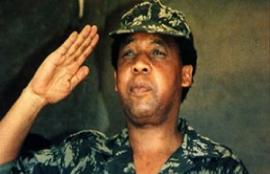
Deputy President Paul Mashatile has hailed the late Chris Hani as a revolutionary leader and a revered freedom fighter, whose assassination in April 1993 marked a pivotal moment in South Africa’s transition to democracy.
Delivering the keynote address at the 32nd anniversary of Hani’s assassination commemorative event, held in Sabalele Village, Cofimvaba - Hani’s birthplace in the Eastern Cape, Mashatile reflected on Hani’s legacy and the sacrifices he made for South Africa’s democracy.
Hani, the former Chief of Staff of Umkhonto weSizwe, was gunned down outside his home in Dawn Park, Boksburg, by radical right-wing Polish immigrant Janusz Waluś, who was released on parole in 2022.
Despite attempts by his killers to incite civil war, the Deputy President said Hani’s death united the nation in its pursuit of freedom, culminating in the country’s first non-racial elections on 27 April 1994.
“Today, the world has come to know Martin Thembisile as Chris Hani, a revolutionary, a commissar, a leader, a parent, a husband, and a martyr, whose blood and sacrifices cleared the way to the 1994 historic political breakthrough,” he said on Thursday.
The Deputy President highlighted Hani’s contributions to the armed struggle, his leadership in the Umkhonto Wesizwe Liberation Movement, and his unwavering commitment to justice and equality.
He praised Hani’s bravery, recounting his role in the Luthuli Detachment, where he led soldiers across the crocodile-infested Zambezi River and struck fear into the apartheid regime.
Mashatile also emphasised Hani’s vision for a better South Africa, rooted in principles of social justice.
“We must never allow the rhetoric which suggests that democracy is the worst form of government, and that apartheid was better than a democratic state.
“Nor must we allow some of us as beneficiaries of this huge sacrifice of many fallen martyrs, like Chris Hani, to discredit democracy through shameful deeds like corruption, stealing from the State and the poor, killing for positions, and fighting to access positions for selfish interests.”
The country’s second-in-command said Hani believed that societal progress should focus on providing basic needs, such as shelter, water, healthcare, and education rather than abstract theories.
“Our reality is that we are not exactly where Chris Hani would have liked us to be as a nation,” Mashatile admitted, pointing to persistent poverty, underdevelopment, and inequality in former homeland areas.
The Deputy President used his platform to call for urgent action to address issues, such as gender-based violence (GBV), unemployment, and corruption, which he said undermine the sacrifices of struggle heroes like Hani.
He urged South Africans to work together to build a more equitable society and economy, while also diversifying trade partnerships to reduce dependence on specific markets.
Mashatile announced plans to elevate the annual commemoration of Hani to a national event, focusing on development, heritage, and the values Hani stood for.
This year’s initiatives include the construction of a sports facility at a local school in Sabalele and the repatriation and reburial of liberation combatants.
“Chris Hani did not die in vain. We must honour his name not only with words but with work, compassion, and bold, urgent action. Let this moment remind us that the struggle is not over,” Mashatile stressed.
The commemoration served as a call to action for South Africans to continue fighting corruption, underdevelopment, and inequality and to build a nation that reflects the vision of heroes like Chris Hani.
Government of National Unity
The Deputy President also used his platform to touch on the Government of National Unity (GNU) in South Africa, which faces several challenges.
The GNU comprises 10 political parties, each with differing perspectives on various issues, the diversity of which, he said, can lead to disagreements and difficulties in reaching consensus.
“What we need to understand about the GNU is that we may have different views on issues, but once an agreement has been reached, we must all speak with one voice. This was also the case with Chris Hani; he had a strong view about the armed struggle, and when the ANC was prepared to engage in negotiations, the leadership decided to drop it, which he opposed.”
The Deputy President said effective governance in the GNU requires balancing individual viewpoints with collective decision-making. – SAnews.gov.za


